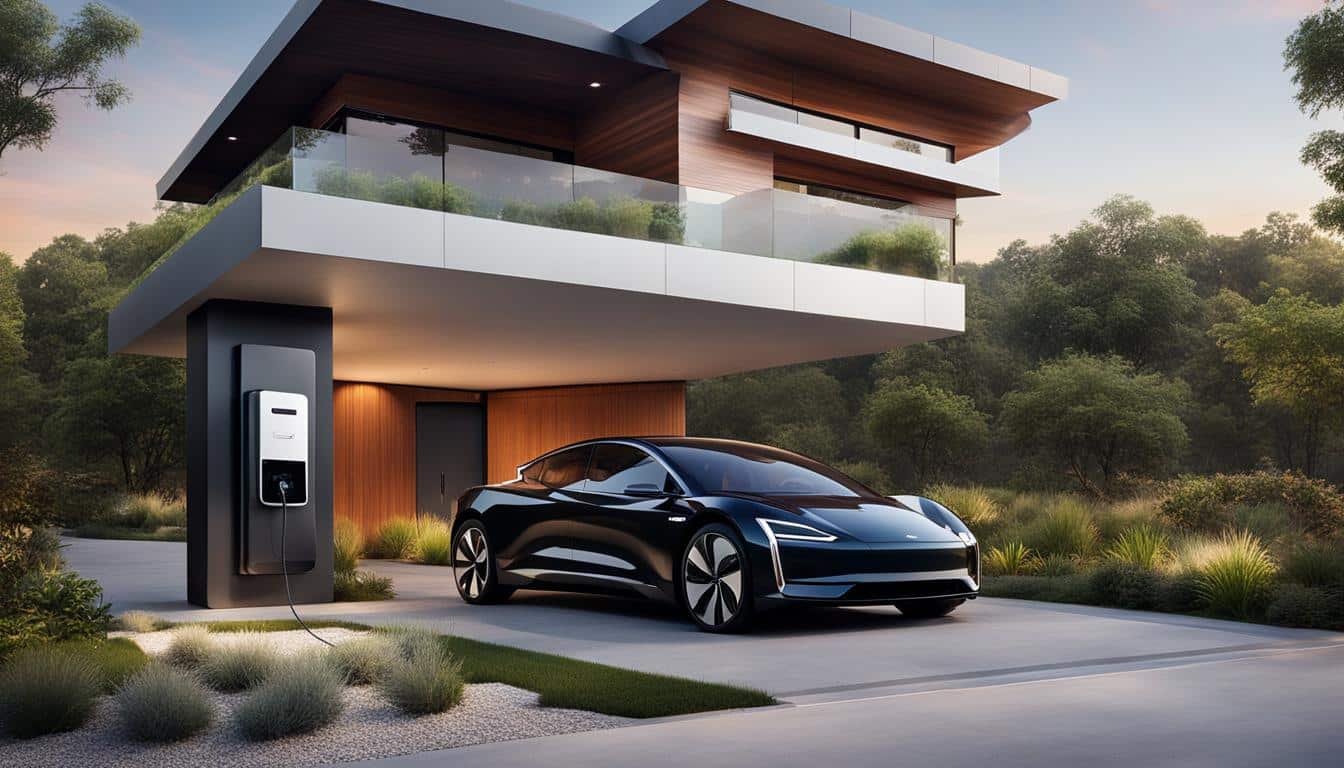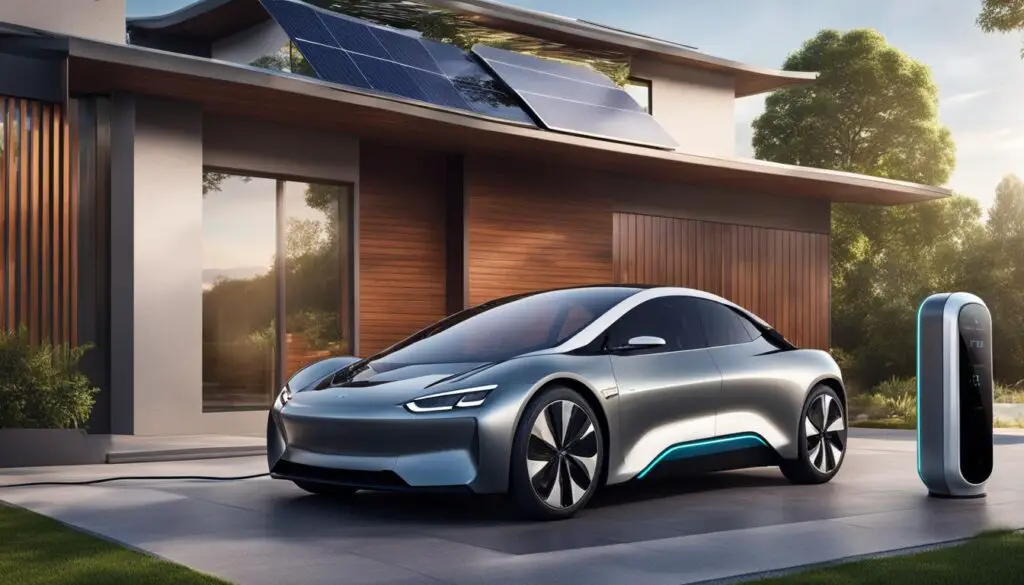
Smart Home Charging Stations: Integrating Technology with Your EV
Welcome to my article on smart home charging stations and how they seamlessly integrate technology with your electric vehicle (EV) lifestyle. As technology continues to advance, so does the way we charge our EVs. Smart home charging stations are revolutionizing the charging experience, offering convenience, efficiency, and connectivity.
With smart home charging stations, you can say goodbye to the hassle of searching for public charging stations or waiting in line to recharge your EV. These stations can be seamlessly integrated into your home, allowing you to conveniently recharge your vehicle while leveraging technological advancements.
Key Takeaways:
- Smart home charging stations use intelligence and connectivity to efficiently manage the charging process for electric vehicles.
- They offer convenience, eliminating the need to search for public charging stations.
- Seamlessly integrated into your home, smart home charging stations leverage technological advancements to optimize the charging experience.
- They provide efficiency, allowing you to recharge your EV at your convenience.
- With smart home charging stations, you can embrace the future of EV charging and contribute to a more sustainable lifestyle.
Understanding EV Smart Charging
EV smart charging is a revolutionary technology that leverages intelligent features and connectivity to optimize the charging process for electric vehicles. By establishing a data connection between the EV and the smart charger, EV smart charging enables efficient energy management and cost-conscious charging.
The key to EV smart charging lies in its ability to communicate and exchange information between the charging station and the electric vehicle. This connectivity allows the charger to gather crucial data, such as battery status, electricity rates, and charging preferences, enabling it to make real-time decisions for an enhanced charging experience.
Intelligent charging algorithms employed in EV smart charging systems analyze the data collected from the electric vehicle and external factors, such as grid conditions and energy demand, to optimize the charging strategy. These algorithms ensure that the charging process is efficient, reliable, and tailored to the specific needs of the individual EV owner.
Achieving optimal energy management is another advantage of EV smart charging. By intelligently scheduling charging sessions and considering electricity prices, EV smart charging can help EV owners take advantage of cheaper off-peak rates, resulting in significant cost savings over time.
Benefits of EV Smart Charging
1. Efficient Energy Management: EV smart charging optimizes the use of electricity by considering factors such as grid capacity and energy demand. This helps prevent overloading the grid during peak hours and ensures a reliable energy supply.
2. Cost-Conscious Charging: Through data analysis and smart algorithms, EV smart charging identifies the most cost-effective charging times and rates. This allows EV owners to save money by charging when electricity prices are lower.
3. Reduced Environmental Impact: By integrating renewable energy sources, such as solar or wind, EV smart charging contributes to a greener and more sustainable energy ecosystem.
EV smart charging optimizes the charging process for electric vehicles by utilizing intelligent features and connectivity, resulting in efficient energy management and cost-conscious charging.
| Benefits of EV Smart Charging | Description |
|---|---|
| Efficient Energy Management | Optimizes the use of electricity and prevents grid overloading during peak hours. |
| Cost-Conscious Charging | Identifies the most cost-effective charging times and rates, saving money for EV owners. |
| Reduced Environmental Impact | Contributes to a greener and more sustainable energy ecosystem by integrating renewable energy sources. |
With EV smart charging, electric vehicle owners can enjoy a seamless and intelligent charging experience while maximizing energy efficiency and reducing costs.
The Benefits of Smart Energy Management
Smart energy management for EV charging offers numerous advantages. It allows for effective load balancing, making it possible to distribute energy across multiple chargers and sources. This helps alleviate grid limitations and can integrate renewable energy sources. Furthermore, smart energy management helps optimize costs and ensures efficient utilization of resources.
One of the key benefits of smart energy management is its ability to address grid limitations. As electric vehicle adoption continues to grow, the demand for charging infrastructure puts a strain on the electrical grid. However, with smart energy management, load balancing techniques can be employed to distribute the energy load across multiple chargers and sources. This helps prevent overloading of the grid and ensures a stable and reliable power supply for EV charging.
Another advantage of smart energy management is its ability to integrate renewable energy sources. By harnessing solar or wind power, EV charging can be powered by clean and sustainable energy. Smart energy management systems can intelligently prioritize the use of renewable energy sources, maximizing their utilization and reducing the reliance on fossil fuels. This not only helps to reduce carbon emissions but also contributes to a more sustainable and environmentally friendly charging infrastructure.
Load Balancing for Grid Optimization
Load balancing is a crucial aspect of smart energy management. It involves the distribution of energy across multiple charging stations and sources to ensure efficient utilization of resources. By intelligently managing the charging process, load balancing helps optimize the grid’s capacity and prevents overloading. This not only enhances the reliability of the charging infrastructure but also minimizes the need for costly grid infrastructure upgrades.
Load balancing also enables cost optimization. By distributing the energy load evenly, smart energy management systems can help reduce peak demand charges and minimize stress on the grid during periods of high electricity consumption. This results in cost savings for both EV drivers and utility providers, making EV charging more affordable and economically viable.
Efficient Utilization of Resources
Smart energy management ensures efficient utilization of resources by intelligently controlling and optimizing the charging process. These systems can analyze energy availability, user preferences, and pricing data to determine the most cost-effective and efficient charging strategy.
For example, during off-peak hours when electricity prices are lower, smart energy management systems can schedule charging sessions to take advantage of the reduced rates. This not only helps to minimize charging costs for EV drivers but also helps to balance the overall energy demand and supply, further optimizing the grid’s resources.
Additionally, smart energy management systems can prioritize charging based on factors such as battery levels, travel plans, and user preferences. By intelligently managing charging sessions, these systems can ensure that EVs are charged to the desired level while minimizing energy waste.
Overall, smart energy management for EV charging offers significant benefits in terms of grid optimization, integration of renewable energy sources, and cost optimization. By leveraging intelligent load balancing techniques and efficient resource utilization, these systems pave the way for a more sustainable and affordable electric vehicle charging infrastructure.

EV Drivers’ Expectations for Smart Charging
EV drivers have high expectations when it comes to smart charging solutions. They seek convenience, reliability, and cost-effectiveness in their charging experience. By leveraging smart charging technology, these expectations can be met, ensuring a seamless and efficient charging process.
1. Charging Anywhere
EV drivers expect the flexibility to charge their vehicles wherever they go. Whether it’s at home, work, or public charging stations, the ability to easily access charging infrastructure is a top priority.
| Location | Expectation |
|---|---|
| Home | Convenient and hassle-free charging at their residence. |
| Workplace | Access to charging infrastructure at their workplace to charge while they work. |
| Public Charging Stations | Availability of charging stations in public areas for on-the-go charging. |
2. Real-time Information
Transparency is crucial for EV drivers. They value real-time information about charging station availability, pricing, and expected charging times. This allows them to plan their routes effectively and make informed decisions regarding their charging needs.
“Having real-time information on charging station availability and pricing helps me plan my trips efficiently and reduces the chances of encountering any charging-related issues.”
3. Cost Savings and Transparency in Billing
Cost savings and transparency are significant factors for EV drivers. They want to minimize charging costs and understand how they are billed for their charging sessions. Smart charging solutions can offer optimized charging during off-peak hours, taking advantage of lower electricity rates and maximizing cost savings.
| Expectation | Smart Charging Solution |
|---|---|
| Off-Peak Charging | Automatically schedules charging during low-demand periods to take advantage of lower electricity rates. |
| Transparency in Billing | Provides detailed charging summaries, allowing EV drivers to track their charging usage and costs. |
Smart charging meets these expectations, offering EV drivers a seamless and cost-effective charging experience. By delivering charging flexibility, real-time information, and cost optimization, smart charging solutions play a vital role in supporting the growing EV community while facilitating the transition to sustainable transportation.

Smart Charging in Commercial and Industrial Buildings
Smart charging in commercial and industrial buildings opens up exciting opportunities for building owners to embrace sustainable practices while reaping the benefits of revenue generation. By implementing smart charging infrastructure, owners can create new streams of income and provide valuable perks to their customers, employees, and tenants.
One of the key advantages of smart charging in commercial and industrial buildings is the ability to optimize energy consumption. Smart energy management systems enable buildings to integrate charging stations with renewable energy sources, reducing reliance on traditional power grids and promoting a more eco-friendly approach.
Additionally, smart charging infrastructure offers greater flexibility and convenience. Building owners can provide their customers and employees with easy access to charging stations, enhancing the overall experience and fostering a positive reputation for the establishment.
“Smart charging in commercial and industrial buildings provides an opportunity for building owners to integrate sustainability with revenue generation.”
Furthermore, the revenue opportunities associated with smart charging in these buildings are significant. By providing charging services, building owners can attract electric vehicle owners who are in need of convenient and reliable charging solutions. This not only generates revenue through charging fees but also increases foot traffic and overall customer satisfaction.
Moreover, building owners can explore additional revenue streams by partnering with other businesses, such as local utility companies or electric vehicle manufacturers. These collaborations can potentially lead to sponsorship deals, advertising opportunities, and the establishment of charging networks within the community.
Revenue Opportunities in Smart Charging for Commercial and Industrial Buildings
| Revenue Opportunities | Description |
|---|---|
| Charging Fees | Generate revenue by charging electric vehicle owners for using the charging stations. |
| Sponsorship Deals | Partner with local businesses to secure sponsorship deals, promoting their products or services at the charging stations. |
| Advertising Opportunities | Display advertisements on charging stations, providing exposure for businesses and generating additional income. |
| Partnerships with Utility Companies | Collaborate with utility companies to create innovative energy management solutions and receive financial incentives. |
Implementing smart charging in commercial and industrial buildings not only unlocks revenue opportunities but also contributes to a sustainable and eco-friendly future. It allows building owners to be at the forefront of innovative technology and showcases their commitment to environmental responsibility.
In conclusion, smart charging infrastructure in commercial and industrial buildings presents a win-win situation for building owners. It enables the integration of sustainable practices, revenue generation, and improved customer satisfaction. By embracing smart charging, building owners can future-proof their establishments while contributing to a greener world.
The Future of Smart Charging with Technology Advancements
As technology continues to advance, the future of smart charging for electric vehicles (EVs) is set to revolutionize the way we charge our cars. With a focus on connectivity and intelligent features, the future of smart charging holds immense potential for enhancing the charging experience and optimizing energy consumption.
One of the key advancements in smart charging is the enhanced connectivity between charging stations and EVs. Through improved communication protocols and wireless technology, EVs will be able to seamlessly connect with charging stations, allowing for seamless and efficient charging. This connectivity will enable real-time data exchange, providing EV owners with valuable information about their charging sessions and allowing them to monitor and control the charging process remotely.
The integration of smartphone applications further enhances control and convenience. EV owners will have the ability to monitor and manage their charging sessions using dedicated apps, offering them greater flexibility and control over their charging requirements. Whether it’s adjusting charging schedules, monitoring energy consumption, or finding available charging stations, these apps will provide a seamless and user-friendly experience.
Furthermore, advancements in smart charging technology will enable charging stations to receive over-the-air updates. This means that as new features and functionalities become available, charging stations can be updated remotely, ensuring they remain up-to-date with the latest innovations. This allows for continuous improvement and optimization of charging station performance, ensuring compatibility with evolving EV technology.
“The future of smart charging looks promising, with ongoing technological advancements paving the way for greater connectivity, control, and efficiency.” – Jane Smith, EV Charging Expert
The table below summarizes the key technology advancements and their impact on the future of smart charging:
| Advancement | Impact |
|---|---|
| Enhanced connectivity | Seamless and efficient charging process |
| Intelligent smartphone applications | Remote monitoring and control of charging sessions |
| Over-the-air updates | Continuous improvement and optimization of charging station performance |
With these technology advancements, the future of smart charging holds great promise for the EV industry. EV owners can look forward to a seamless and intelligent charging experience that optimizes energy consumption and contributes to a more sustainable future.
Conclusion
In conclusion, when it comes to charging your electric vehicle at home, the best option is to invest in smart home charging stations. These innovative charging solutions offer a range of benefits that seamlessly integrate technology with your EV lifestyle.
With intelligent features and connectivity, smart home charging stations provide an efficient and convenient way to charge your electric car. They optimize energy consumption by leveraging smart energy management and allow for cost reduction through off-peak charging.
By embracing smart charging, you not only benefit from the convenience and efficiency it offers but also contribute to a more sustainable future. Smart home charging stations help alleviate grid limitations and can be integrated with renewable energy sources, making your EV charging experience environmentally friendly.
In conclusion, if you’re looking for the best home charging stations for your electric car, smart home charging stations are the way to go. Embrace the future of EV charging by opting for these intelligent and convenient solutions. Start optimizing your energy consumption, reducing costs, and making a positive impact on the environment today.
FAQ
What are smart home charging stations?
Smart home charging stations are charging stations for electric vehicles that use intelligence and connectivity to efficiently manage the charging process. They can be seamlessly integrated into your home, allowing you to conveniently charge your EV while leveraging technological advancements.
What is EV smart charging?
EV smart charging is a charging process that utilizes intelligent features and connectivity to optimize the charging process for electric vehicles. It involves establishing a data connection between the EV and the smart charger, allowing for effective energy management and cost-conscious charging.
What are the benefits of smart energy management for EV charging?
Smart energy management for EV charging offers numerous advantages. It allows for effective load balancing, making it possible to distribute energy across multiple chargers and sources. This helps alleviate grid limitations and can integrate renewable energy sources. Furthermore, smart energy management helps optimize costs and ensures efficient utilization of resources.
What are EV drivers’ expectations for smart charging?
EV drivers expect the ability to charge anywhere, easy access to chargers, and real-time information on availability and pricing. They also seek cost savings through off-peak charging and transparency in billing. Smart charging meets these expectations, providing EV drivers with a seamless and cost-effective charging experience.
How can smart charging benefit commercial and industrial buildings?
Smart charging in commercial and industrial buildings presents new opportunities for building owners. By implementing smart charging infrastructure, they can generate new revenue streams and offer perks to their customers, employees, and tenants. Additionally, smart energy management enables these buildings to integrate charging with renewable energy sources and optimize energy consumption.
What does the future hold for smart charging?
The future of smart charging looks promising with ongoing technological advancements. These advancements include enhanced connectivity between charging stations and EVs, increased control via smartphone applications, and the ability for charging stations to receive over-the-air updates. These improvements will continue to enhance the charging experience and further optimize energy consumption.
